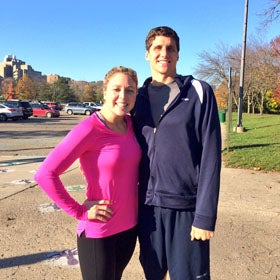Shared here is an excerpt of a story in The Ringer about how college athletics are providing access to mental health care. Athletes Connected is also prominently mentioned as leaders in this area.
By Julie Kliegman /cdn.vox-cdn.com/uploads/chorus_asset/file/9535907/21686023_10210255159039925_5523584034612510729_n.jpg)
Austin Cannon | Evan Watkins–247 Sports
Fewer than 25 Division I schools had a full-time licensed mental health practicioner on staff in the athletic department as of January 2014, according to ESPN, let alone more resource-strapped Division II and III schools. While that number of professionals has been growing in recent years—per one 2016 survey, mental health clinicians are now in as many as 39 percent of Division I athletic departments—there’s still a critical gap in mental health care for student-athletes who often have access to the support they need physically and academically. That will persist unless this issue remains at the forefront of the college sports conversation.
“The stereotype is that student-athletes are tough somehow or more put together than others. No, people are people.” — Brian Hainline,
NCAA chief medical officer
When players are expected to leave the athletic department’s facilities to seek care, they get the message that they’re outsiders, that what they’re dealing with isn’t a problem common among their peers. They can get the impression that they need to separate who they are as student-athletes from the ways in which their brains work.
“Within the athletic department, a full-time mental health professional that you would point athletes to, that’s something that even top-level FBS schools are just trying to get on—in my opinion—the right side of,” Fagan tells The Ringer.
Having the ability to access mental health support in the same place that they often meet with trainers, watch game tape, and work with academic tutors is key for student-athletes, who face pressure to push down any perceived on- or off-field weaknesses, even when they experience mental illness. College athletes experience anxiety and depression at slightly lower rates than their nonathlete peers, according to an American College Health Association survey based on students’ experiences in 2011, but they’re less likely to seek help for those issues. And while anxiety and depression are two common, relatively low-stigma mental illnesses, they’re far from the only ones student-athletes face: Experts say they also routinely see athletes with eating disorders, personality disorders, and substance-use disorders.
“The stereotype is that student-athletes are tough somehow or more put together than others,” says Brian Hainline, the NCAA’s chief medical officer. “No, people are people.”
* * *
Student-athletes are also a driving force in the push for better mental health care. As mental illness—particularly common diagnoses like anxiety and depression—becomes less stigmatized, players feel more comfortable speaking out. In addition to its association-wide initiatives, the NCAA in 2014 funded Athletes Connected, a University of Michigan campaign to destigmatize mental illness among college athletes and encourage them to seek help.
Kally Fayhee, a swimmer who graduated from Michigan in 2013, embraced being part of Athletes Connected after contemplating backing out about five or six times. At that point, she says, only a handful of people knew about her bulimia. She’d been swimming competitively since she was 10, but her experience in college felt different. “When I got to Michigan, it was a whole other level of competitiveness, of trying to live up to the expectation, the swimmer that your scholarship means that you are,” she says.
During her freshman year, Fayhee started feeling what she calls “race anxiety,” which hampered her performance. “The harder I tried to control it and white-knuckle it, the worse it got, and the worse the anxiousness got,” she says. Needing to feel some element of control over her races, she started restricting her diet as a sophomore, thinking that if she were lighter, she could go faster. By junior year she was purging. With the help of a close friend and teammate, she began weekly visits to Barb Hansen, a clinical social worker and athletics counselor at Michigan.
Joining Athletes Connected in 2014 meant that, for the first time, the former team cocaptain would speak publicly about her bulimia and how everything in her life wasn’t as perfect as it may have seemed. “You know what, the only way that we’re going to break down the stigma around mental health is if we have a conversation about it,” she remembers telling the first crowd of Michigan student-athletes she spoke to alongside Will Heininger, a former Wolverines defensive lineman who has experienced depression. After one of the sessions, a current student-athlete approached Fayhee to say that she needed help. It made Fayhee’s late nights and early morning commutes between Chicago, where she worked, and Ann Arbor worth it. “Honestly, at that point I would’ve woken up at 3 in the morning and done that until the end of time if we could help kids where I was,” Fayhee says.
Read the rest of the story on TheRinger.com.



 “After college, I was working as a phlebotomist trying to get some experience before nursing school. During that time, it was kind of easy to continue working out. I was still living in Ann Arbor, so I was able to do drop-in practice with the masters swim team. I had enough time to take care of myself. But once I started nursing school — I did a 13-month accelerated bachelor’s program — there was no time for anything.
“After college, I was working as a phlebotomist trying to get some experience before nursing school. During that time, it was kind of easy to continue working out. I was still living in Ann Arbor, so I was able to do drop-in practice with the masters swim team. I had enough time to take care of myself. But once I started nursing school — I did a 13-month accelerated bachelor’s program — there was no time for anything. I think this is an important message to share because I think it’s something that’s not talked about a lot. You move away from your university, and you don’t have that support system. And the more people I talk to, I realize there are a lot of people who had similar struggles, and they keep that in because they think they’re alone in it and it’s stigmatized. Make yourself a priority.
I think this is an important message to share because I think it’s something that’s not talked about a lot. You move away from your university, and you don’t have that support system. And the more people I talk to, I realize there are a lot of people who had similar struggles, and they keep that in because they think they’re alone in it and it’s stigmatized. Make yourself a priority.




/cdn.vox-cdn.com/uploads/chorus_asset/file/9535907/21686023_10210255159039925_5523584034612510729_n.jpg)